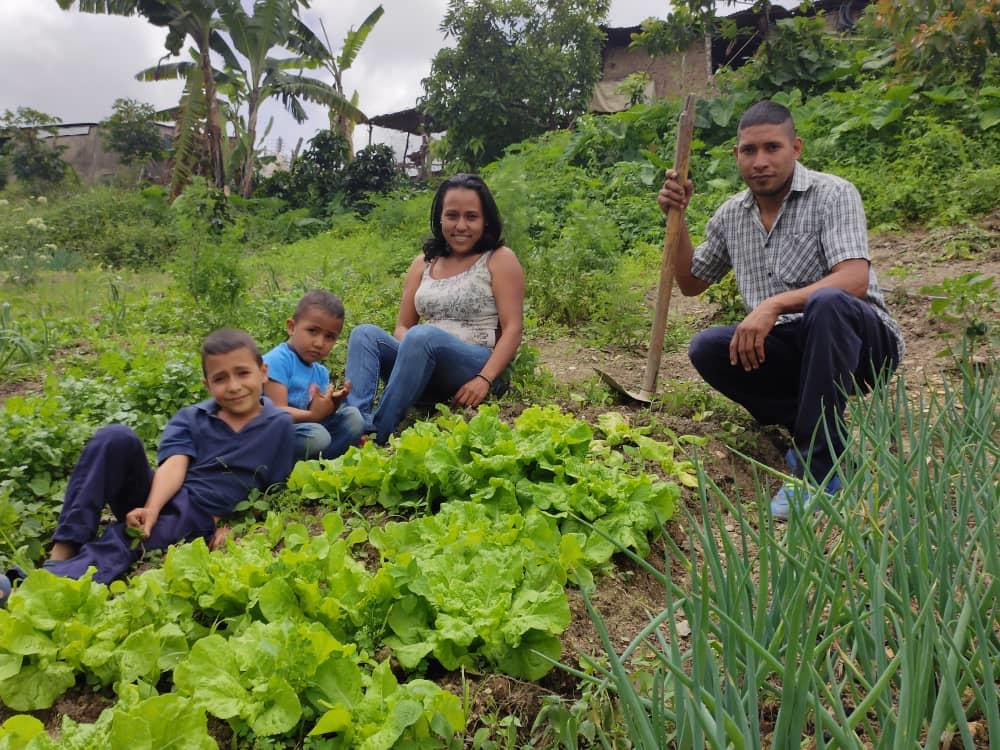
Family farming blossoms in the mountains of Venezuela
Seeds and tools help families improve their food security and self-sufficiency amidst ongoing crises
In a remote Venezuelan farming town, Eliana and her family depend on their garden for food and income through droughts, an economic crisis and the COVID-19 pandemic. ©FAO/Rohnal Valderrey
05/03/2021
To get to and from Caspo you can either take a motorbike or walk. Those are the two main modes of transportation used by the residents of this small mountain town in the central-western region of Venezuela. A dirt road that runs through the mountains is the only connection between this remote farming town and the next largest city, Sanare, about 20 kilometres away. Coffee plants are plentiful here, but houses are very distant.
It is in this town in Lara state, where Eliana Alvarado lives, with her husband Pablo Márquez, and their two sons, Santiago, who is seven, and Moisés, who is four.
Eliana has just turned 30. She is in the middle of a college degree, aspiring to be a teacher, but she has worked in agriculture since she was young.
“Pablo and I sow our land to feed our family. We also sell some of our produce or barter with the neighbours. Here in Caspo, we have worked with coffee for a long time, but that is a harvest that occurs only once a year. That's why we also have our small parcel of land sown with other crops,” she explains.
Eliana and her family used to rely on the sale of food from their garden and on income from picking other people's crops. This only covered about 50 percent of their needs, however, and her family would rely on the government for the rest. They used all of their money just to cover their most basic necessities, principally food.


The FAO-ECHO project provides seeds, tools and technical assistance to help Eliana and other farmers in Lara state increase their production, enhancing their food and nutrition security. ©FAO/Rohnal Valderrey
Enhancing production
Eliana is part of a group of 387 families from Lara state, beneficiaries of an FAO project aimed at increasing the production of family agriculture.
This initiative is funded by the Directorate General for Civil Protection and Humanitarian Aid of the European Union (ECHO) and promotes resilience in families struggling to meet their needs. The project provides agricultural inputs, such as seeds and tools, and technical assistance to improve livelihoods and thus strengthen food and nutrition security.
In June 2019, Eliana remembers how they first arrived at her home: “A neighbour told me that FAO was visiting homes in Caspo. Then a technician came to my farm to ask about the needs of the community. I took the opportunity to tell him that what I most needed were seeds. We like to work, but it is always very difficult for us to buy the seeds.”
And that is one of the things that FAO did: distribute vegetable seeds. Some of the seeds, such as tomatoes, were a novelty for Eliana’s family who had no experience planting them since those particular seeds "are very expensive and we had never been able to buy them," she explains.
Diversifying crop production to include more fresh vegetables and improve the diet of families is a core aim of the project, especially in the midst of the COVID-19 pandemic, when fresh foods are harder to come by.
With this production, Eliana has found not only a trade that she shares with her husband, but a way of life and a tradition that she is passing down to her two boys.
Their love for plants and agriculture, she explains, is something “we instil in our children, day by day, so that they learn that by sowing they can feed themselves and live healthily. I have taught them to be proud of the fact that we can eat the plants we grow in our own garden, and that they are healthy and free from pesticides and other substances.”

The project diversified the crops grown, introducing more vegetables into the mix and therefore into diets. Many vegetables seeds had been too expensive for families to purchase in the past. ©FAO/Rohnal Valderrey
Great challenges
Venezuela faces a situation of increasing food insecurity amidst a prolonged economic emergency. In addition, Caspo has been living a period of prolonged drought since 2016. Due to the el Niño effect in Venezuela, Lara state’s food production in the 2019 harvest season decreased by approximately 45 percent, mainly attributable to lack of water. Then came the COVID-19 outbreak in March 2020. This has further hampered household access to food because of breaks in the local food supply chain, acute scarcity of fuel and increasing devaluation of the local currency.
The family farmers of Caspo, even in their remote mountains, feel the impact on their daily activities. "It is very difficult for us to obtain fertilizers, so we try to plant inexpensive crops,” says Eliana. “We also have as a problem the lack of water."
Aware of the many challenges that local communities face, FAO is also providing technical support to improve their sowing and harvesting processes. Likewise, the FAO project works with the local community and experts to promote better nutritional habits, while strengthening livelihoods and rescuing the traditional farming knowledge of Venezuelan farmers.
“It is a great blessing that FAO has come here and wants to work with us on this project, so that we, as families, can move forward in our own home and with our own effort,” says Eliana.
Related links
Learn more

